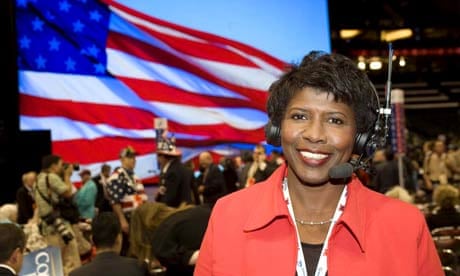Toward the end of the 2004 vice-presidential debate in Cleveland, Ohio, US public television's Gwen Ifill asked a question that neither Dick Cheney nor John Edwards expected.
It showed.
Ifill described an Aids epidemic in the US, where black women were 13 times more likely to die of the disease than other women.
"What should the government's role be in helping to end the growth of this epidemic?" Ifill asked.
For Ifill, it was a memorable moment, one that lived on when viewers wrote to express their frustration with the weak answers the candidates had for her question.
"One of the most gratifying responses afterward came from viewers who knew when questions weren't answered," Ifill said.
Ifill will be moderating tomorrow's vice-presidential debate at Washington university in St Louis, Missouri, and while Joe Biden and Sarah Palin may listen to dozens of mock questions in their debate preparation this week, they're sure to get one or two from Ifill that they don't expect.
What she asks might touch on any topic imaginable under the negotiated rules, which call for Biden and Palin to be situated behind lecterns with shorter discussion periods and two minutes each for closing statements.
Given Ifill's hard-news background, her questions are unlikely to be softballs.
Ifill, who turned 53 on Monday, has been senior correspondent for PBS's The NewsHour since 1999 as well as moderator of Washington Week on the public broadcast channel. Before that, she covered politics and public policy for the New York Times, Washington Post and Baltimore Evening Sun.
Knowing news, Ifill is keenly aware of the interest in the St Louis debate - and especially in Palin.
Indeed, a few of Palin's devotees complained to PBS that Ifill's facial expressions after the Alaska governor's acceptance speech at the Republican National Convention in St Paul last month conveyed something less than rapture.
Ifill says it was flat wrong to read anything into how a camera might have caught her at a certain moment and that criticism comes with the job.
"If I was sensitive to criticism, I wouldn't take this job. It comes from both sides," she said.
An estimated 43.5 million viewers tuned in to Ifill's questions in Cleveland. That number is sure to be higher for the St Louis debate, perhaps closer to the 65.1 million viewers who watched when Geraldine Ferraro took the stage in 1984 against George Bush Sr, the first national debate with a woman competing. (It was moderated by Barbara Walters.)
Recalling her moderator debut four years ago, Ifill notes the antidote she has for stage fright: "As long as I had all the questions, I was the one with the with the upper hand."
Ifill had more to say during an interview in St Louis:
Is there any question about the intense interest in this debate?
Judging from my email inbox, there's no question at all. An hour doesn't pass when another self-described bright question arrives. I don't mind it; I want to know what people are curious about. But with so much organised spam email, It's hard to know what's really on people's minds.
Is Sarah Palin the reason people are so excited about this debate?
Part of it preceded Sarah Palin. At every turn in this election year, there has been exceedingly high interest in this race. I think it matters the presidency is open. When you talk about change - whoever takes this job is going to be very different than we have now. People are engaged.
How do you prepare for an event of this magnitude?
I don't know (laughing). I'm in the middle of it right now. I just read everything out there. I try to be the best-informed person on the stage and read everything that has been written about people and go as far back as possible.
What do you think of the final agreement on the debate format?
It's actually less restrictive than four years ago [in the Cheney-Edwards debate] even though it's not as open as originally negotiated. In the interest of getting more information, I always think that exchange is healthy and good.
Won't this somewhat restrictive format demand more artfulness from the moderator?
As it happens it I'm very artful (laughing.) It's kind of like I do every day on NewsHour: I engage in conversations with people and elicit as much information as possible. I think voters are very smart. They can tell whether candidates evade or answer questions.
What do you hope is said about this debate afterward?
Just that I was fair, I guess. Even that I can't hope for because people are so polarised.
